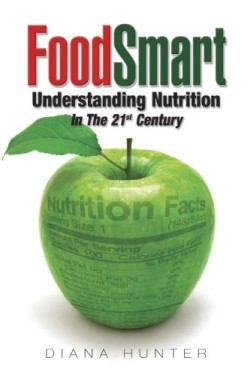FoodSmart
Understanding Nutrition in the 21st Century
Because of growing rates of obesity and other food-related disorders, nutrition is a hot topic, with a legion of diet purveyors and nutrition experts weighing in on what to eat to stay healthy. But with so much information, advice can be confusing and difficult to navigate. FoodSmart, penned by nutritional researcher Diana Hunter, directs the river of guidance into an accessible, easily-forged stream of useful thought.
Acknowledging the confusion that crops up in the field, Hunter writes, “As consumers we can benefit most by being proactive and knowing how to best become educated about nutrition as it affects us individually. In short, learning how to learn about nutrition is the key.”
By first covering nutritional research methodologies in a digestible manner, she sets up a strong framework for discussing a broad array of issues, such as food labeling, macronutrients, diets, and even food and drug interactions. She’s particularly adept at linking food and disease states and giving easy-to-follow suggestions for boosting health. For instance, in covering acid reflux problems, she provides a list of common foods that can worsen symptoms.
One of the most distinctive features of the book is its formatting; rather than listing resources in an appendix and including sidebars with relevant information, Hunter instead puts references within each chapter, and there’s plenty of blank space for jotting notes in the margins. This approach should prove hugely valuable to nutritionists and other readers who might want to use the book as a combination of handbook and journal.
For example, in her “Food Safety & Technology” chapter, she covers issues like how chemicals can be stored in fat cells, how irradiation affects foods, and what to consider when deciding whether to buy genetically-modified fruits and vegetables.
To compile all this vital data, Hunter draws on her experience as a researcher, a journey that began for her nearly 25 years ago after she suffered personal food-related health issues of her own. She is the author of a previous food-related work, The Ritalin-Free Child: Managing Hyperactivity & Attention Deficits Without Drugs.
Unlike some experts who specialize in nutrition advice, Hunter doesn’t lean toward a black-and-white point of view—condemning genetic modification, for example—but instead presents the issues clearly and advises readers to explore the topics in more depth so they can draw their own conclusions. By crafting such a wide-ranging guidebook for an often confusing topic, Hunter provides a valuable starting point for anyone who wants to learn more about making smart food choices.
Review date: January 2010.
Disclosure: This article is not an endorsement, but a review. The publisher of this book provided free copies of the book and paid a small fee to have their book reviewed by a professional reviewer. Foreword Reviews and Clarion Reviews make no guarantee that the publisher will receive a positive review. Foreword Magazine, Inc. is disclosing this in accordance with the Federal Trade Commission’s 16 CFR, Part 255.

